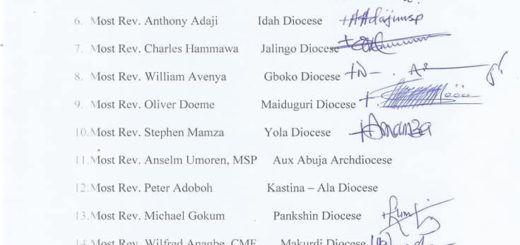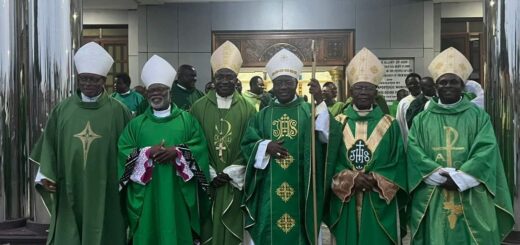The person and ministry of the prophet of social justice, Amos
by ARCH BISHOP · July 11, 2021
Fifteenth Sunday, Year B. Homily by Archbishop I. A. Kaigama at Christ the King Parish, Kubwa, Abuja, July 11, 2021.
Readings: Amos 7:12-15; ps. 84(85): 9-14; Eph. 1: 3-14; Mk. 6: 7-13
I bring you greetings and blessings from all the priests of our Archdiocese at the end of our annual retreat concluded on Friday. I am also happy to see you, the people of God in Christ the King Parish, Kubwa. The last time I visited, we celebrated Mass facing empty pews on account of the Coronavirus pandemic. We thank God for making it possible for us to meet physically today, to pray together and to confirm 168 candidates, and to bless your new Church building. May God shower His blessings on all you parishioners and prosper the work of your hands.
I wish to focus today on the person and ministry of the prophet of social justice, Amos, from Tekoa, a little village in the land of Judah. He was a shepherd and a dresser of sycamore trees who was called to go and prophesy to the northern kingdom of Israel, which was rich and prosperous. Amos travelled through the cities of Israel denouncing social injustice, oppression of the poor and other terrible social vices committed by religious and political leaders.
While Amos was telling the king and his people about repentance, speaking out against the luxurious lifestyle of the priests, the social injustice, economic exploitation and gross neglect of the needs of the poor by political authorities and the affluent, Amaziah the priest was having a good time, wining and dining with the king. He instigated the king to send Amos away back to the South as he was such a nuisance. Amos had to defend his calling by God with courage.
We have Ministers of God today who betray their priestly and prophetic mandate in order to please political leaders. Amaziah represents all those who benefit from the fortunes of those in power, and refuse to speak for the good of the poor, the less privileged and the downtrodden. The type of conflict between Amos and Amaziah persists even today. While many “men of God” claim to be speaking the mind of God, there is a difference between those who are truly called and sent by God and those who are merely working for their stomach like Amaziah. Even more unfortunate is the fact that the Amaziahs have taken over the kings’ courts today and block everyone from coming near those in public office. They are also quick to dismiss or manipulate every advice, observation or criticism that the Amos of our time offer to the Excellencies, Distinguished and Honourable leaders.
Like Amos, who was merely a shepherd but God called him, so are all of us called by our baptism, whether men or women, young or old, educated or illiterate, professional or non-professional, skilled or unskilled, to be priests, in order to intercede for others; called to be kings, in order to serve others, and called to be prophets in order to proclaim the truth of the word of God. St. Paul reemphasizes in the second reading that the primary purpose of our calling by God is “to be holy and without blemish before him” (Eph. 1:4), to respond to God’s call and not to allow ourselves to be distracted by the inordinate cares of this world.
As Jesus sent the Apostles, next week we shall be sending priests to another 21 newly created Pastoral Areas, Christ is not just asking them to preach repentance, to convert people but to also heal the sick and to cast out demons. In our society where the forces of darkness seem to dominate, the dangers of materialism and secularism seem to be pervasive; incessant killings, corruption and kidnappings seem to be the new normal, there is the strong demand for more partnership, mutual support among all Nigerians, rather than exclusiveness.
The Amaziah syndrome in Nigeria holds back our development. Very often we hear, “Go back to your State, to your tribe; here is not your land.” After having been born in a place, schooled and worked for an entire life, one is still considered a stranger and does not qualify to obtain an indigene certificate. Had the father of former US President Barack Obama, been required to present an indigene certificate before settling and studying in the United States, Obama might not have been born there, not to talk of being elected to the prestigious office of the President of the United States. Many Mayors and prominent officials of Nigerian origin hold key positions in Europe and the US today. Back home it is unthinkable to find a Nigerian holding a lucrative or influential position outside of one’s state of origin; no matter how qualified the person may be, despite what we sing in our national anthem about being bound in freedom, peace and unity.
This “go-back-to-your-home” mentality must not infiltrate the Church and the Church must not lower her moral standards; she must always uphold Jesus as the Way, the Truth and the Life (cf. Jn. 14:6).
Even when we face rejection as the Gospel reading today suggests, we must continue to preach in favour of victims of social injustice, economic manipulation, violence, unabated crime and poverty; to continue as Pope Francis says “healing the wounds of the heart, opening doors, forgiving all, liberating, and saying that God is good, forgives all, is Father, God is gentle and always waits for us”.
I urge all Nigerians to work together with faith, dedication, selflessness and zeal, so that we don’t only achieve social cohesion and genuine progress, but also that our names will be written in the book of life after our earthly sojourn.




